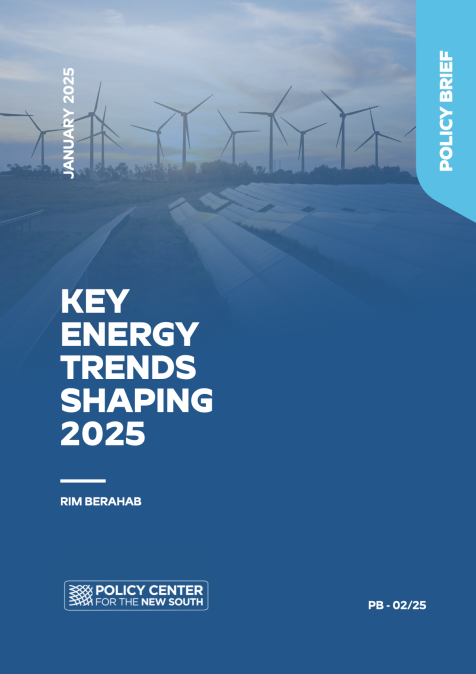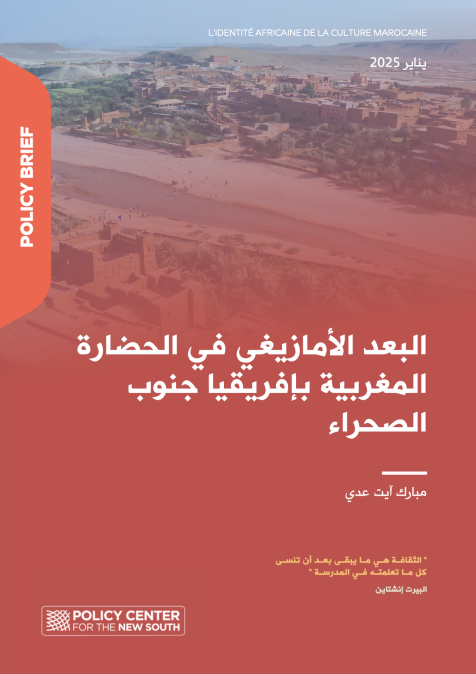RELATED CONTENT
-
January 16, 2025Alors que les défis globaux – changement climatique, transition énergétique, montée des conflits – s'accumulent, les outils multilatéraux peinent à offrir des solutions efficaces. La montée du protectionnisme et des intérêts nationaux exacerbe ces tensions, tandis que l'Afrique, riche e...
-
AuthorsJanuary 15, 2025The global energy landscape in 2024 reflects a complex interplay of geopolitical tensions, economic pressures, and uneven progress in clean energy transitions. Despite record growth in renewable energy deployment and advancements in low-carbon technologies, the world continues to fall short of meeting its climate goals. Fragmented markets, entrenched fossil fuel dependencies, and supply chain vulnerabilities continue to challenge energy security and hinder global decarbonization eff ...
-
Authorsمبارك آيت عديJanuary 13, 2025هذا البحث مقتطف من كتاب ”الهوية الأفريقية للثقافة المغربية“. شـكلت التجـارة العابـرة للصحـراء إلـى عهـد قريـب، فرصـة للمغـرب ولإفريقيـا جنـوب الصحـراء ليكتشـف كل طـرف ثقافـة وحضـارة الآخـر. حظـي هـذا التواصـل المبكـر باهتمـام دراسـات كثيـرة، داخـل القـارة الإفريقيـة وخارجهـا؛ تجمعهـا خاصيـة فـي حاجـة إلـى إعـادة النظـر، تتجلـى فـي اختـزال هـذه الدراسـات للمؤثـرات الحضاريـة المغربيـة فيمـا وراء الصحـراء عبـر ترسـيخ البعـد العربـي، بمـا فـي ذلـك اللغـة العربيـة والديـن الإسلامـي ...
-
Helmut Sorge, Duncan WoodJanuary 10, 2025Our modern world relies on fragile systems—vulnerable to risks like massive solar storms, dependent on rare earth minerals, and deeply interconnected with China’s dominance in global supp ...
-
AuthorsBoglarka BozsogiJanuary 10, 2025The Lake Chad Basin and the Sahel regions have faced multidimensional conflict since 2011. Violence, attributed mostly to violent extremist organizations (VEOs) affiliated to al-Qaeda and the Islamic State, has put both regions on the global map of the deadliest armed conflicts and worst humanitarian crises. Since 2012, tens of thousands of people have been killed, while at least six million people have been displaced in the two regions combined.Simultaneously, floods since August 2 ...
-
January 9, 2025Transatlantic cooperation is key to addressing shared challenges like climate change, maritime security, and transnational crime. Initiatives such as the Atlantic Partnership and Zopacas emphasize sustainable development, the blue economy, and digital connectivity, highlighting the need...
-
January 7, 2025يخصص مركز السياسات من أجل الجنوب الجديد حلقة برنامجه الأسبوعي "حديث الثلاثاء" لمناقشة موضوع "دور معاهد التخطيط في تعزيز التنمية المستدامة ''. تُعد معاهد التخطيط مؤسسات علمية مهمة لدعم التنمية المستدامة من خلال توفير البيانات والتقارير والإحصاءات الدقيقة، مما يسهم في صياغة سياسات مبنية ع...
-
January 3, 2025Dans cet épisode, nous discutons avec Amina Benkhadra, Directrice Générale de lOffice National des Hydrocarbures et des Mines (ONHYM), au sujet de l’Initiative Atlantique Royale. Ce projet visionnaire, lancé par Sa Majesté le Roi Mohammed VI, vise à connecter les pays du Sahel au littor...
-
أميرة الشال , إيمان لهريش, إيمان مصطفىJanuary 03, 2025تتناول هذه الحلقة من سلسلة بودكاست مركز السياسات من أجل الجنوب الجديد مفهوم المرونة الاقتصادية بوصفه أداة أساسية لفهم ديناميات الاقتصاد المصري في مواجهة الصدمات المتكررة والتحديات الهيكلي ...
-
December 31, 2024نخصص هذه الحلقة من برنامج "حديث الثلاثاء" لمناقشة تأثير الثورة التكنولوجية على مستقبل الوظائف في الدول العربية، مع التركيز على الكفاءة والاستدامة، كما نتناول الفرص والتحديات التي يطرحها هذا التحول بمشاركة السيدة نجلاء الأهواني، أستاذة الاقتصاد بجامعة القاهرة ووزيرة التعاون الدولي السابق...






